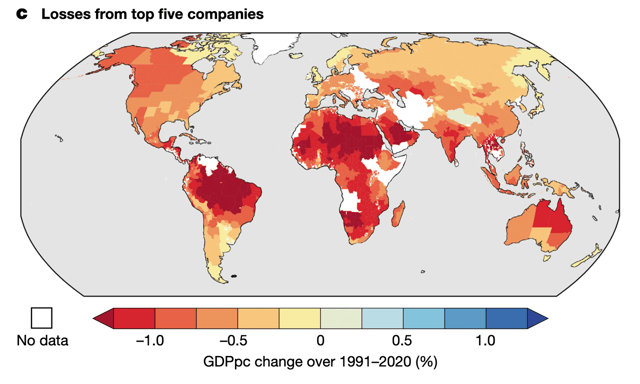
In November, a Dutch court ruled in Shell's favor on an appeal in a big international climate case. It got loads of headlines around the world, but it wasn't quite the win for Shell that a lot of media coverage has made it out to be. This was an appeal of a 2021 ruling. It held that Shell is required to reduce all of its global emissions everywhere that it operates, including what are called “Scope 3 emissions,” so not just the emissions of its operations, but also the emissions associated with the use of its products. In 2021 a lower Dutch court ruled that Shell had to reduce those emissions by 45 percent by the end of 2030. It was a huge ruling and an unexpected one. Shell, predictably, appealed that ruling, and this new judgment is the result of that appeal.
The biggest thing that the court walked back was this specific number, 45 percent by 2030. That's the commitment that countries have made under the Paris Climate Accord. What the court called into question was whether that same commitment is directly applicable to Shell or whether it needs to be adjusted for particular companies. So that's what's been reported as this big win, but at the same time that the court said it's not quite sure about these specific numbers, it reaffirmed that Shell is in fact required to reduce its global emissions, including Scope 3, because its failure to do so could make it impossible for the Netherlands to meet its commitments under the Paris climate accord.
That's actually a pretty big deal. So much so that one expert I spoke with even said he would not be surprised to see Shell appeal this ruling, despite the fact that they're currently taking a victory lap in the news.
Jasper Teulings, strategic advisor to the nonprofit Climate Litigation Network, and Noah Walker Crawford, Research Fellow with the Grantham Research Institute of the London School of Economics, joined me on the podcast to discuss the implications of the ruling. A transcript of the episode follows (and you can listen along below!).
Transcript
[00:02:38] Jasper Teulings: So, Milieudefensie, the Dutch NGO, which is a branch of the Global Friends of the Earth network, started this case in 2018.
[00:02:50] Amy Westervelt: This is Jasper Teulings talking about the origins of this case.
[00:02:54] Jasper Teulings: And they were initially successful. They secured a court order Which, ordered Shell at the headquarter level to bring its emissions down in line with the Paris Agreement.
So 45 percent reduction by 2030 across all of its emissions. So not just its own production, also the product itself. So that's really a groundbreaking ruling and across all of its companies across the world. That ruling has now been overturned, but in part, in fact, most of it still stands.
[00:03:35] Amy Westervelt: Yeah, I think that's the piece that like seems to be missing from a lot of the coverage. So can you explain that? What has been chucked out and what remains?
[00:03:46] Jasper Teulings: thing that has not been awarded, and that's not a small thing, right? It is the court order that. No, you're the fancy salt against shell to reduce the emissions. But the ruling by the Court of Appeals in The Hague contains a lot of stuff that's really fundamental and groundbreaking, and will offer lots of, material and fodder for climate litigation and climate obligations from years to come.
So, the Court of Appeal said, " there can be no doubt that protection from dangerous climate change is a human right. It is recognized worldwide that states have an obligation to protect their citizens from adverse effects of dangerous climate change."
So when it comes to climate change as being a human right, and that states have an obligation, that was clearly affirmed here. But more importantly, I think this is the other real foundation of this case. The court held that Shell has a duty to reduce its emissions. And I'm going to quote again," The Court of Appeal is of the opinion that companies like Shell, which contribute significantly to the climate problem and have it within their power to contribute to combating it, have an obligation to limit CO2 emissions in order to counter dangerous climate change even if this obligation is not exclusively laid down in public law regulations of the countries in which the company operates, companies like Shell does have their own responsibility in achieving the targets of the Paris Agreement." So that is pretty strong and unprecedented. What the court couldn't do was grant an emission reduction order . The Paris Agreement applies to states and the 45 percent reduction that the court in first instance ordered, it applies at state level globally. So the court of Appeals said we can't directly transpose that to companies like Shell. We'll have to find other norms for that. And those norms are currently not sufficiently crystallized. So I think this is also the disappointing bit. The court could have perhaps gone for the minimum baseline that all of the reduction pathways, agree on , 25%. This is also something that Milieudefensie had asked for, but it didn't, and we'll just have to live with it.
But this is also why many have called this a Pyrrhic victory for Shell. Because those reduction pathways are forthcoming. They're currently being developed at sectoral bases in the EU context. It's only a matter of time. It won't take long before those emission pathways are there. And a company like Shell, in court, can be held accountable for it and can be forced to reduce its emissions.
[00:07:16] Amy Westervelt: I asked Noah Walker Crawford at the London School of Economics about what kind of evidence or research exactly is needed to build out those pathways to the point where a court might feel comfortable insisting that a company stick to them
[00:07:31] Noah Walker Crawford: what was interesting about this decision is that the court said, you know, that companies have legal obligations to reduce their emissions that companies like shell must abide by the Paris agreement. They have human rights obligations, which has. You know, impacts on on companies, climate policy, and so there's no doubt to the fact that they have to reduce their emissions.
The question is precisely by how much and they are the court looking at the science found such divergent numbers that they came to the conclusion that at the moment, there's no scientific consensus. And so they can't make a legal determination. So what we need on the scientific side is more research looking specifically at how much emissions have to be reduced for different sectors.
And so this is research that's already ongoing. And if we look to some of the other ongoing cases against corporations, so the so called, corporate ambition cases that are about whether companies have to reduce their emissions going forward. Some of the other cases have put forward more sector specific calculations in terms of emissions reductions.
So, for example, there's a case against the cement company in Switzerland, another 1 of the carbon majors. And in that case, the plaintiffs, use some, data from the IPCC, where the global emissions reduction target is translated into a, a sector specific target for cement, which I think it's 42 percent. Or there's a lawsuit brought by Greenpeace VW in Germany, which is also very similar in the sense that it's about getting VW to switch more quickly towards electric cars and reduce its, scope 3 emissions that way. And there, there was a very specific calculation that was made for Volkswagen, in terms of translating these global targets to stay in line with 1. 5 degrees. So this is, possible. But, in the shell case, the court didn't find, enough evidence to do, or they found that necessary evidence to calculate it specifically for shell hadn't been put forward. But that's not to say that it couldn't be done in the fairly near future.
[00:09:44] Amy Westervelt: Do you think that that leaves the door open for, a follow up case that does have that calculation included?
[00:09:52] Noah Walker Crawford: I imagine there will be many follow up cases on this. So, with the better science, with a bit more scientific research there, I imagine, calculation of the necessary emissions reduction can be done specifically for shell and for other companies like shell, so it's likely that there are going to be more cases like this in the future.
Another interesting point is that the court actually raised something else, which hadn't been brought up by the plaintiffs. Namely that in the court's opinion, it may be not. It doesn't seem to be aligning existing targets with existing emissions. So, it almost seemed like the invitation from the court to, to bring new cases against Shell over, oil exploration and production.
[00:10:47] Amy Westervelt: I asked Teulings about this evidence gap as well.
It strikes me and I, and I heard this from, Noah this morning as well that what a lot of it speaks to is the need for some additional scientific evidence, but that's not, an insurmountable level to reach. What's your take on what's needed to be able to say this percentage is what's required and here's how they are or are not hitting it? What's the evidence gap, I guess.
[00:11:19] Jasper Teulings: Yeah, you could say it's an evidence gap or a normative gap, that the court felt uncomfortable in crossing on its own. I think a part of it is science, but the science I think mostly is already there. It's how to translate the science. Maybe I can take a step back, and,... the real win of the Milieudefensie approach has been, it's already been codified. It's already been adopted into law. When the court in first instance ruled that Shell has this obligation to reduce its emissions that basically paved the way for EU legislation.
All large companies to not just publish their emissions and publish a plan to reduce their emissions, but they also have to put that plan into effect and the specific piece of regulation That contains this key provision. is called the Corporate Sustainable Due Diligence Directive.
And the Shell ruling, the initial one, paved the way for this. So that obligation is there. It's not just applicable to Shell, it's applicable to all large companies. Irrespective of what sector they operate in. That's, that is the real win. The European Union, European Commission will also issue guidance. And that guidance will contain the sectoral pathways that the court was looking for. And those will be issued well before the directive kicks into effect, actually, which is July 2027. So Shell has bought itself some time, but not that much.
[00:13:08] Amy Westervelt: Here's Noah Walker Crawford again.
[00:13:09] Noah Walker Crawford: a whole lot of ways, they actually lost. And even though it wasn't successful in terms of binding or obliging Shell to commit to certain emissions reductions, it did set an important precedent. So, when the judge was reading out the verdict on Tuesday in the court, she first discussed all the kind of fundamental points, all the substantial points at stake here. And she said that, uh, yes, corporations like shell do have to abide by the Paris agreement. They do have to take action. They're legally required to take action to address climate change. In the verdict itself. The judges addressed the argument that shell made that they have no responsibility for their scope three emissions.
The court said, this argument does not hold water. So. The court made very clear that corporations like shell fossil fuel companies have a legal responsibility for these emissions.
So this is not a reason for shell or other fossil fuel companies to celebrate. With this kind of strategic litigation with climate litigation, we've seen in the past that, you know, these cases build on each other much the way we saw with litigation against tobacco companies in the past, which took decades and where there were many unsuccessful cases, but with each case, you could learn something and move to the next one.
[00:14:37] Amy Westervelt: I asked Walker Crawford if companies headquartered in countries that are not signed on to the Paris Climate Accord or that pull out of it, the United States, could also be affected by this ruling.
[00:14:52] Noah Walker Crawford: yes, absolutely. Whatever countries, corporations operate on and in, they're subject to that country's laws. And if that country says that corporations need to abide by the Paris targets, for example, that's something that they can ultimately be held liable for in that, jurisdiction.
[00:15:12] Amy Westervelt: When I read this ruling, one of the things that I was thinking about was the extent to which a lot of these companies are pushing through false solutions.
[00:15:22] Jasper Teulings: This particular ruling didn't really deal with CCS or, CDR, you know, carbon dioxide removal. It's definitely something that the fossil fuel companies are leaning on and, That the level of dependency is is really problematic, especially in the long run.
We need real emission reductions now, and they have to be drastically reduced. This is exactly what the court said. What the court also said is, Shell, has currently lots of expansion plans, 800 fields they currently have in development, and that's simply irreconcilable.
[00:16:02] Noah Walker Crawford: currently we're in a situation where this technology is being celebrated by a lot of actors, including the big oil companies as a technology that will help fight climate change if it's sufficiently scaled in the future . In a sense, this gives these companies somewhat of a free card to continue emitting more based on the promise that technology will help capture lots of carbon in the future, but that's not guaranteed.
We don't know whether that's actually going to be possible. And so this is an issue. And when we're talking about emissions reduction pathways, some of the pathways that are put forward by fossil fuel companies assume that there will be significant carbon capture in the future. But since that's not guaranteed from a scientific standpoint, we might say that's wishful thinking if we want to be on the safe side, we need to reduce emissions more drastically today.
We can't depend on technologies that might or might not be feasible in the future.
[00:17:06] Amy Westervelt: Right. Shell has estimated the potential of carbon capture actually at a much higher level than other oil majors, which is interesting in the context of a case like this where they're saying you're not taking into account all the things that we're doing to contribute to acting on climate.
[00:17:24] Noah Walker Crawford: Yeah, that's why it's all the more important to explain very clearly to the courts in these cases, what kinds of assumptions are being made in different emissions reductions pathways. And so, in this case, there was a legal discussion where the plaintiffs and others and defendant shell were putting forward very different figures of what kinds of emissions reductions will be necessary.
But the problem here is that when shell were putting forward arguments, that was based on the idea that CCS will play a significant role in the future, but if it doesn't, then those pathways that they're claiming will be possible, they, they won't work to keep emissions in line with the Paris agreement targets.
[00:18:10] Amy Westervelt: That's a huge thing to look out for in the year ahead, especially as our reporting and others is increasingly finding not only that carbon capture does not live up to the potential that oil companies describe, but also that they are well aware of the technology's shortcomings. I asked fillings what else to look out for in the next year.
[00:18:33] Jasper Teulings: There are already a number of, cases that have been inspired, if you will, by the Shell case. So, there are cases pending against Total in France, against BNP Paribas for its fossil fuel financing in France, where similar measures are sought to reduce the emissions or to stop funding fossil fuel expansion.
There's a case pending against Volkswagen in Germany. There's a case pending against the cement company, one of the other carbon majors in Switzerland, on behalf of inhabitants of an Indonesian island, where similar measures are sought. One case I find particularly interesting has been filed in Italy against Eni, the Shell of Italy, a large fossil fuel company, and the interesting thing with them is that they are partially state owned, about 5 percent of the shares are owned by the Ministry of Finance and the 25 percent are owned by the State Development Bank. And they are co defendants in the case. And the demand against them is to bring their voting policy as a state in line with the Paris Agreement. So I think that points to particularly interesting avenue where state owned enterprises are pursued via the state as a shareholder to implement those very same duties, the state duties, the human rights, climate obligations through their voting policies. I think that's a powerful avenue, one that bodes well for the future.
[ music up]
[00:20:06] Amy Westervelt: And that's it for this time. I hope you found that breakdown of the shellcase interesting and we'll definitely be keeping an eye on these and other cases as they move forward. Thanks for listening and don't forget to check out drilled. media for more.


